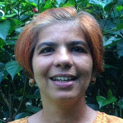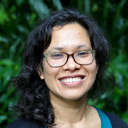Concerns about gender equality and women’s empowerment are re-emerging as part of the post-2015 development agenda on the global agenda. The recent United Nations Survey Report on the role of women in development makes a strong case for linking gender equality and sustainable development on the grounds that the “causes and underlying drivers of unsustainability and of gender inequality are deeply interlocked.”
The report also notes: “Women’s knowledge, agency and collective action are central to finding, demonstrating and building more economically, socially, and environmentally sustainable pathways to manage local landscapes; adapt to climate change; produce and access food; and secure sustainable water, sanitation and energy services.” Many of these themes overlap with research by the Center for International Forestry Research (CIFOR)—even though forests and trees occupy only a small part of the report.
In this piece, CIFOR researchers Kiran Asher and Bimbika Sijapati Basnett discuss the report’s key messages, and the relevance of its normative and analytical framework for organizations such as CIFOR that are attempting to integrate gender in their research and proposals for action.
Sijapati Basnett: What are the survey report’s key messages, and what is noteworthy about them?
Asher: The World Survey makes a strong case for putting gender equality at the center of the search for sustainable development. The survey has three key messages:
- The concept of, and actions for, sustainable development must contain an explicit commitment to gender equality, women’s empowerment and women’s rights;
- there are synergies and trade-offs in the links between gender equality and sustainable development, and both must be acknowledged and addressed;
- the participation of women and civil society organizations must be actively sought in order to creatively address and negotiate trade-offs and policy dilemmas.
What is noteworthy about these messages is that they are unambivalent about putting gender equality and women’s welfare at the core of the emerging global agenda on sustainable development and climate change.
Furthermore, the report is positive, but not sanguine, about linking gender equality and sustainable development. It explicitly notes that “while the participation of women is vital, their involvement in policy interventions aimed at sustainability does not automatically mean greater gender equality, particularly when the structural foundations of gender inequality remain unchanged.”
Indeed, many current efforts to achieve sustainable development and respond to climate change continue to be assessed on economic growth, income and emission-centric grounds. Consequently, issues of power imbalances, inequality and exclusion—which are fundamentally gendered and define who gains and who loses from such interventions—are relegated to the periphery. By calling for an active engagement with women and civil society groups, the report recognizes that policy negotiations are not power-neutral.
Sijapati Basnett: What is the report’s approach to linking gender equality and sustainable development? How is it similar to or different from other ways of conceptualizing and implementing sustainable development?
Asher: The report takes a rights-based approach to gender equality and sustainable development, which is based on the premise that assuring the well-being of all humanity is a moral and ethical imperative. Such a framework differs from an instrumentalist argument that asserts that women’s empowerment (or the value of something) will lead to better economic, environmental or social outcomes. A rights-based argument does not ignore women’s key contributions to promoting development and conservation, however, it does not make the granting of rights contingent on how effectively or efficiently they contribute to the latter.
Women and gender have been on the development agenda for almost half a century, and include debates on whether women’s rights are best assured on the grounds of economic efficiency or equity. The report engages both, and “identifies three criteria for assessing if policies, programmes and actions taken in the name of sustainability are likely to achieve gender equality and women’s rights, especially the rights of marginalized groups, who are likely to bear a disproportionate share of the costs of economic, social and environmental unsustainability.”
That is, the survey calls for a critical look at standard models of development, and the way they may result in or perpetuate social inequalities and environmental risks, albeit unintentionally. For example, economic development models use economic growth or productivity measures in the aggregate as indices of development. Such indices are problematic because they tend to undervalue women’s contributions to economic growth.
Pollution and environmental degradation also tend to become the negative “externalities” of development policies and programs that emphasize growth and productivity. Recent efforts to address sustainability focus on environmental aspects but have yet to come up with adequate ways for conceptualizing or accounting for social disparities and unmet human needs. For example, as the report points out, recent interventions in the forestry sector in the name of climate change mitigation such as REDD+ (Reduction in Emissions from Deforestation and forest Degradation) and CDM (Clean Development Mechanisms) prioritize global sustainability standards and risk excluding local users.
These risks include undermining their livelihoods and exacerbating existing inequalities, including gendered ones.
Aren’t the report’s finding and discussion about women’s unpaid care work congruent with your research on women as right bearers and risk bearers, and how that impacts their relations to forests?
Sijapati Basnett: The report is strongly informed by extensive feminist research demonstrating that unpaid care work is disproportionately undertaken by women the world over. Such work remains “invisibilized” and under-appreciated, and thus limits women and girls from realizing their full range of capabilities. The report argues that unsustainable development patterns intensify and exploit women’s unpaid care work. Thus, potential links and trade-offs between gender equality and sustainable development need to be considered from the “care perspective.” Indeed, the report calls for the need to assess the potential and performance of sustainable development investments that aim to reduce unpaid care work for women and girls.
But data on women’s unpaid care work is noticeably lacking. This is a particular lacuna from a forestry perspective. For instance, although recent research on the poverty-environment nexus has collected valuable data on who collects what types of forest products, for what purposes, and from which categories of forests, there is limited data on how this compares with other intra- and extra-household responsibilities.
Furthermore, global comparative studies on REDD+ have generated information on women and men’s relative participation on REDD+ processes, but not on how such processes impinge on, or are projected to influence, women and men’s relative work burden. Therefore, there is a critical role for independent, non-partisan research organizations such as CIFOR to routinely collect time-use data and incorporate care work as an important analytical category when proposing and assessing interventions in sustainable development in forested landscapes.
Asher: Can CIFOR’s research draw on and inform the report’s proposals?
Sijapati Basnett: Yes. In Chapter 6 on “Investments for Gender Responsive Sustainable Development,” the report advocates for investing at scale on fuel-efficient cooking technologies so that the technology improves and that it is widely used. This is because in most countries, women are responsible for collecting fuelwood and charcoal for domestic consumption. The physical burden of such collection affects women’s health and reduces the time that they are able to devote on other tasks of their choice.
But such investments in developing countries remain under-prioritized because the social benefits of such technology (in terms of its impact on gender equality at a societal level) outweigh the private ones (in terms of what individual women or their households are willing to pay). Market-driven investments are either unlikely to flow or have limited reach. The concluding and policy recommendation section therefore calls for developing “public-private-civil sector alliances that enable investments at scale to guarantee universal access … while ensuring compliance with human rights standards.”
I believe CIFOR must draw on these messages for our research and policy engagement with emerging, market-driven initiatives such as REDD+, green economy and zero-deforestation pledges.
Asher: In other words, we need to be attentive to the structural inequalities that may be silently or inadvertently perpetuated by market-driven approaches and the commodification of resources for green growth. This is congruent with putting human welfare at the forefront of sustainable development and underscoring the importance of public engagement in both determining and safeguarding gender equality.
Kiran Asher may be reached at k.asher@cgiar.org. Bimbika Sijapati Basnett may be reached at b.basnett@cgiar.org.
CIFOR’s research on gender forms part of the CGIAR Research Program on Forests, Trees and Agroforestry.
We want you to share Forests News content, which is licensed under Creative Commons Attribution-NonCommercial-ShareAlike 4.0 International (CC BY-NC-SA 4.0). This means you are free to redistribute our material for non-commercial purposes. All we ask is that you give Forests News appropriate credit and link to the original Forests News content, indicate if changes were made, and distribute your contributions under the same Creative Commons license. You must notify Forests News if you repost, reprint or reuse our materials by contacting forestsnews@cifor-icraf.org.

















